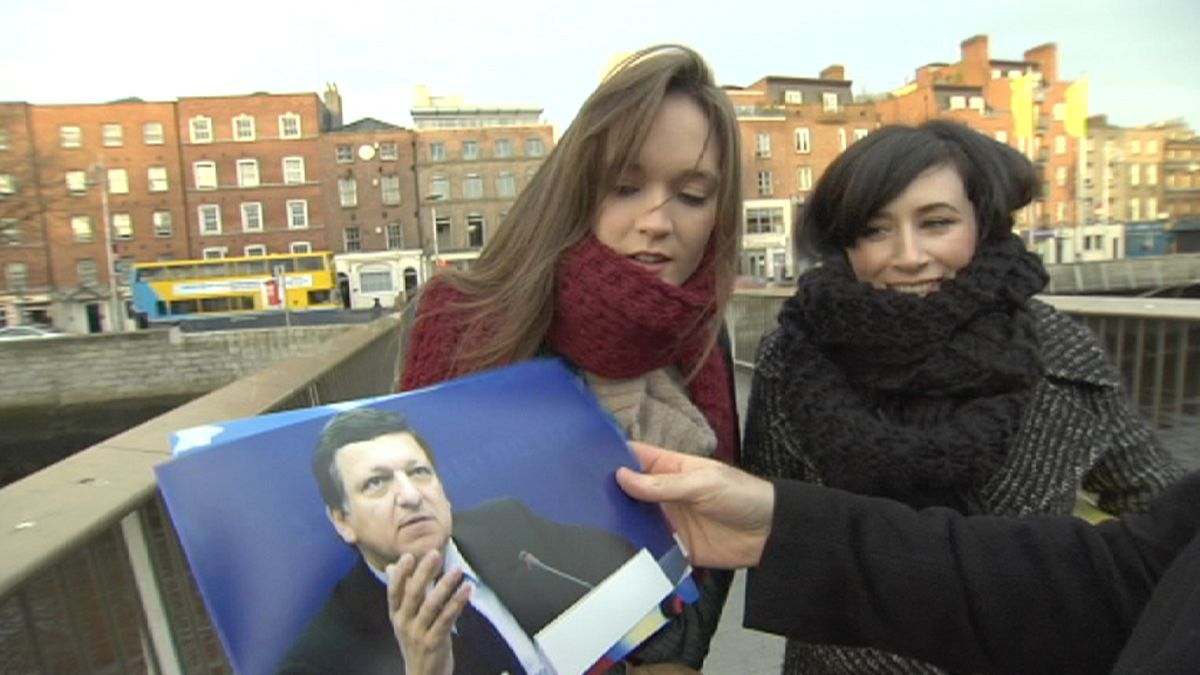Officials in Brussels admit it is a problem they must tackle: how to close the big distance between the European Union and its citizens. In these tough economic times they know that it is crucial to better engage on key issues, if people are to feel more European and to fully use their rights as EU citizens.
Opinion polls show a majority of people do not know their rights as EU citizens, and confidence in the institutions of the bloc has dropped sharply over the past five years.
In a country like Ireland, for example, where there is fierce debate on Europe, Brussels has a tough battle to win the public’s hearts and minds.
One of those attempting to understand more about what is at stake is computer science graduate Declan Meenagh. This visually-impaired 23-year-old is currently unemployed.
“Europe was built on solidarity and I think it’s really important that solidarity continues,” he told Euronews. “We can’t have a union where so many people are unemployed and suffering. I think we also need to look at how we can expand human rights throughout Europe. And also, as more and more things go online, as more digital stuff happens, we really need to focus on how the EU can vindicate European citizens’ rights online.”
Declan decided to attend a recent public meeting hosted by the commission, which wants to take the debate about Europe closer to the public. The so-called Citizens’ Dialogues will take place across the bloc this year, with a European Year of Citizens.
“It’s very positive that we’ve had the President of the European Commission here, but I think they need to come out a lot more often,” said Declan. “It’s a very difficult thing, though, because the EU is so big, it’s so technical, it deals with so many things. One part of it is how can you actually condense that into something that people want to engage with? And that’s the challenge I think.”
But there is also the challenge of getting people to feel more European. How many would recognise the anthem of the European Union, Beethoven’s Ode to Joy, chosen to rouse a feeling of pride? And when it comes to knowing the names and faces of top European figures, many would struggle.
Officials in Brussels agree there is a distance between the EU and its citizens, and concern about how that will affect plans for further integration.
Euronews reporter Seamus Kearney asked Viviane Reding, the Vice President of the European Commission, whether the task was massive. “You have this series of meetings, but don’t you have to have more projects, more ideas to communicate better with European citizens?”
Reding said: “Well we do have the possibility to communicate with citizens. I have launched the first ever citizens’ inquiry, where mostly young people answered, thousands of them. And I thought that was a very good point, because we need the younger generation to come in to help us build the Europe of the future. And then there are the citizens direct contact points in nearly all the areas of the EU, where citizens can ask questions and get an answer.”
The commissioner also maintains that dialogue is taking place in other settings, with policies also being explained by other key actors in member states.
Seamus Kearney reported: “The next venue for the citizens’ dialogue is in Portugal, in the city of Coimbra (Feb 22). European issues affecting education are well known here; this is referred to as the student city, being home to one of Europe’s oldest universities. And when it comes to the future of the bloc, there’s no shortage of opinion.”
The economy is a pressing concern in Portugal and that will certainly be a major talking point.
On the future of Europe, Right On spoke to prominent author and sociology professor Boaventura de Sousa Santos. He argues that to feel as if the EU is theirs, people must directly elect those who govern the institutions.
Santos, Director of the Centre for Social Studies at the University of Coimbra, said: “Right now we have what we call a European deficit, a deficit of democracy. There is democracy at the level of the various European states, but not when it comes to Europe. The European Parliament does not have the powers that it should have, and the executive agency, as in the European Commission, is not directly elected by citizens.”
The professor says leaders should also seek to learn lessons from other continents, while European values must become part of the education curriculum.
Simão Cabral, a law student at the University of Coimbra, told Euronews: “The truth is that we talk about the European Union, but it’s not united. Unfortunately the European Parliament, and the MEPs from each nation represented in the European Parliament, continue to defend the interests of their own country and forget those that are truly important to the union, which are the interests of everyone.”
Another law student, Miguel Martins, said: “There is a great distance between the creation of policy and its implementation in the various countries, because the European population is disinterested. Nobody in Portugul cares – they do now because of the crisis – but normally
they don’t want to know what’s happening.”
There is no doubt many voices are needed to plan the future of Europe; the hard part is creating the right conditions to spark interest and motivate people to speak up.
